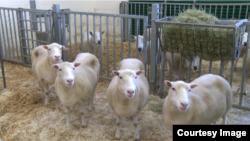The cloned offspring of the first cloned animal are in good health after their eighth birthday, according to a new study.
The four sheep, Debbie, Denise, Dianna and Daisy, are the offspring of Dolly the sheep, who, 20 years ago, became the first cloned animal. At age eight, they are roughly the same age as a human between 60 and 70 years old.
Writing in the journal Nature Communications, researchers from The University of Nottingham say the sheep are showing “no long-term detrimental health effects.”
Dolly did not live as long as her relatives, dying at the relatively young age of 6.5 years, suffering from osteoarthritis. This led many to think cloned sheep might not live as long, but the new study appears to show cloned sheep can be just as healthy as non-cloned ones.
Dolly was born on July 5, 1996, after being cloned from an adult cell using a technique called somatic cell nuclear transfer, or SCNT.
The sheep were tested in a variety of ways to measure the health of their musculoskeletal system because of Dolly’s early demise, as well as checking other functions, all of which were normal except for one mild case of osteoarthritis.
“Healthy aging of SCNT clones has never been properly investigated,” said the study’s lead author, Kevin Sinclair. “Following our detailed assessments of glucose tolerance, insulin sensitivity, blood pressure and musculoskeletal investigations, we found that our clones — considering their age — were, at the time of our research, healthy.”
Researchers plan on continuing to monitor how the cloned sheep age.
Here's a video about Dolly's relatives:





